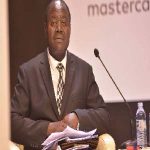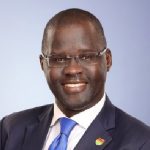Democracy is a process, not an event, Julius Kiiza said
in his opening submission. He said people who refuse to
speak out when things go wrong are to blame for a failing
democracy. “The biggest threat to democratisation is me
and you…those who can do something but choose to remain
quiet.”
Perry Aritua said democracy in Uganda has failed to
materialise because of human rights abuses. “How many
of us spoke out when journalists were being beaten during
the Arua by-election campaigns?” she asked, in reference
to the beating up and detention of journalists during the
riotous Arua by-election in August 2018.
However, Simone Osborn thinks that democratisation
requires patience and energy to cultivate it over time, not
just the voices of citizens. “People say they hear democracy
knocking on the door. But are they willing to open doors for
democracy?”
The panellists moved on to assess whether there
is still hope for democracy is African countries.
Mugisha Muntu said that democracy will succeed because
of the inherent human desire for freedom. He, however,
called on the populace to act instead of only complaining.
“People who want good governance should participate.
The more you stay back, the more you create a vacuum to
be filled by rogues.”
Nicholas Opiyo, on the other hand, noted that for
democracy to be meaningful, the education system has
to be reformed. “Uganda’s education system does not
produce creative and confident people to stand up and
cause change. It concentrates on memory and theories.
Such does not cause the necessary critical mass capable
of participating in politics.”
Since the threats to democracy seem to be
known, the speakers talked about the way
forward.
Forcing leaders to leave power when they are no longer
serving in the interest of their electorate is one of the
solutions, according to Kiiza. “Most African leaders think
that they fought and liberated their countries and need to
rule until they die; tolerate good leaders but fight the bad
ones.” He castigated elected leaders who want to become
“presidential monarchs” immune to criticism. “There is a
resurgence of intolerance and this is something to worry
about.”
Another solution, according to Muntu, is for capable leaders
who can tilt the balance of power in favour of the masses,
to join politics. “While there are many honest people with
integrity and educated people with capability to influence
politics to a much higher level, they shun participation in
that important pillar of human existence.” Muntu added
that strong institutions are also helpful as they work to
check leaders who advance individual interests.
Aritua argued that speaking out and being aware of
counter-narratives against democracy are crucial.
In his parting remarks, Opiyo argued that the level of
awareness about government systems and how they
impact lives, depends on people’s involvement in the push
for democracy. “Across this country, many people still do
not understand the reason there are jiggers in Kamuli and
its direct link with the system of governance and poverty.”
Kampala Geopolitics Conference





